
| Publisher: | W.W. Norton | |
| Genre: | Fiction, Family Life, Literary | |
| ISBN: | 9780393064612 | |
| Pub Date: | September 2011 | |
| Price: | $25.95 |
| Fiction |
by Diana Abu-Jaber
As Hurricane Katrina approaches Miami, the storm that regularly revisits Avis and Brian Muir's marriage is brewing again. Avis wants to meet with their 17-year-old daughter, Felice, who ran away five years before, remaining hopeful of a reunion, while Brian resists opening old wounds. In this richly layered novel, told in alternating chapters by Avis, Brian, their son, Stanley, and Felice, Diana Abu-Jaber captures the tropical heat, sensuality and diversity of Miami. As in her three earlier novels and memoir, The Language of Baklava, she uses food to define characters: Avis is a renowned pastry chef, Stanley owns a health-food grocery, and their enigmatic Haitian neighbor tends a garden of mysterious plants. While the family keeps busy and has moved beyond the initial despair of Felice's abandonment (Brian struggles with his role in the gentrification of ethnic neighborhoods), she has an emotional hold on each of them. Readers will feel an affection and optimism about the family, especially Felice--whatever drove her to run, we want to trust that her intelligence and savvy will lead her safely home.
In Birds of Paradise Abu-Jaber skillfully matches setting with story to create an atmospheric whole. The anxiety and threat of destruction are palpable in the city and in the family; readers will be eager to step into the story, hoping for a satisfying conclusion for the characters they've come to know. --Cheryl Krocker McKeon, bookseller
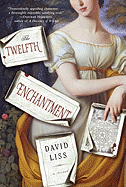
| Publisher: | Random House | |
| Genre: | General, Fiction, Historical | |
| ISBN: | 9781400068968 | |
| Pub Date: | August 2011 | |
| Price: | $26 |
| Fiction |
by David Liss
It's a testament to David Liss's confidence that, deep into The Twelfth Enchantment, he can set up a meeting between Lord Byron and William Blake and then have them barely acknowledge each other's presence, let alone talk about poetry. It doesn't matter: by then, you're totally involved in the story of Lucy Derrick, an orphaned young woman with a precarious reputation who must track down the pages of an alchemical manuscript that will play a critical role in the fight between the Luddites and the Rosicrucians over England's industrial revolution.
Laid out like that, it may sound a bit silly, but from the opening pages, Liss carefully builds up his scenario; as the convincing Regency setting begins to accumulate more and more supernatural features, you may share Lucy's skepticism, but like her you'll become gradually convinced of its plausibility. (No surprise there; Liss has built a loyal fan base on the verisimilitude of historical thrillers like The Whiskey Rebels and A Conspiracy of Paper.) Lucy is guided out of her initial position of helplessness with training in the magical arts from Mary Crawford--yes, Austen fans, that Mary Crawford--but the tight restrictions for a woman in 1800s British society always loom over her adventures. Deftly blending historical facts, folklore and literary allusions, Liss creates a story that refuses neat genre categorization: The Tweltfh Enchantment works equally well as Regency romance and occult thriller. Think The Da Vinci Code, set 200 years in the past... and, truth be told, a rather more elegant prose style. --Ron Hogan, founder of Beatrice.com
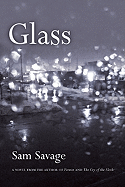
| Publisher: | Coffee House Press | |
| Genre: | Fiction, Literary | |
| ISBN: | 9781566892735 | |
| Pub Date: | September 2011 | |
| Price: | $15 |
| Fiction |
by Sam Savage
Glass is a novel less concerned with linear plotting and development than presenting a psychological portrait of Edna, an elderly woman typing compulsively in her decaying apartment. The clatter of her keys taps underneath every word of the book--pages and pages about her lonely childhood, her unhappy marriage, the empty misery of her day-to-day.
"I used to think the mute incoherent daily suffering of ordinary life was too big for words," she types. "Now I think the words are too big for it. There are no words trivial enough to say how terrible it is."
A sense of looming death hangs over every sentence and in every corner of her dingy home. Edna does her typing behind dirty windows, surrounded by the wilting plants and sick rat a neighbor has left in her reluctant care. She reveals her history in fragments that slowly fit to form the bleak picture of her present.
Edna is a tragic character, though not a particularly sympathetic one; she is pathologically reclusive, snobbish, possibly of questionable moral character. But she is a true writer, and Savage devotes much of Edna's typing--it is always just "typing"--to careful examinations of phrases, astute observations and literary references. She often writes about the word choices she would make "if this were a story."
But, of course, it is a story--one riddled with uncertain memories, strange qualifications and alarming omissions. By its abrupt end, the only thing made clear is that Edna's side of it may not be the right side at all. --Hannah Calkins, Unpunished Vice

| Publisher: | Broadway Books | |
| Genre: | fiction | |
| ISBN: | 9780307889249 | |
| Pub Date: | September 2011 | |
| Price: | $13 |
| Fiction |
by Moni Mohsin
Duty Free is like a tasty lemon tart--sweet, but with a bite. Concocted by Moni Mohsin, an author making her debut in the U.S. with this witty satire, the unnamed diarist of the book is determinedly shallow, silly and oddly endearing. She's a Pakistani society fixture obsessed with fashion, gos sup and image--think The Trophy Wives of Lahore. One charming trait is her constant malapropisms. Her husband, Janoo, is an "oxen," which is, of course, the title for those who have graduated from Oxford. Our heroine has been charged with finding an appropriate wife for her cousin Jonkers. "Appropriate" in this case means from the same "bagground"--rich.
One delightful scene has the narrarator, in a fit of charity, filling a box for refugees with tranquilizers (it's hard to sleep in a noisy camp), copies of Vogue and a local society rag (so the poor will be heartened by the lovely clothes and parties) and her Barbara Cartland paperbacks (for the kids who need books). For clothes, she adds all of Janoo's old Armani ties, since she knows it will cheer the refugees to finally be able to wear Armani, and her chiffon saris for the women.
With the help of the bridal chase, a terrifying attack by a terrorist, the steady wisdom of Janoo and the refusal by Jonkers to factor anything but love into his marriage, the narrator discovers a dollop of her own good sense and an even better heart. Witty, bright, charming and wise, Duty Free is a delightful find. --K.C. Martin, blogger at The Readable Feast
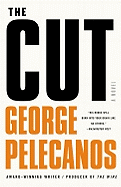
| Publisher: | Reagan Arthur Books | |
| Genre: | General, Fiction, Mystery & Detective | |
| ISBN: | 9780316078429 | |
| Pub Date: | August 2011 | |
| Price: | $25.99 |
| Mystery & Thriller |
by George Pelecanos
George Pelecanos begins another series with The Cut, introducing new protagonist Spero Lucas, a 29-year-old Iraq War veteran who does investigations for a D.C. defense attorney. One of the attorney's clients, a drug dealer, hires Lucas to find and retrieve his stolen shipments of marijuana. The job seems standard fare at first, with Lucas canvassing neighborhoods and looking for witnesses. But then a double murder occurs, and Lucas finds he needs all the warrior skills he learned while fighting in Fallujah to go up against his formidable opponents.
Lucas is an appealing lead, made more so by his contradictions. He's a tough guy who regularly dines with his mother. He has an iPhone but likes reading the print version of the newspaper. He may have witnessed horrors in Iraq but can be refreshingly naïve when it comes to women. And he can work on both sides of the law, as long as the job pays well.
Pelecanos has the amazing ability to cut to the heart of something in very few words. Witness the following: "They kissed standing up in her living room. Her mouth was made for it." Are any more words necessary to describe how perfect the kiss is? As always, the author has a great ear for dialogue, giving Lucas witty banter with his brother Leo, and rarely relying on tags and character attribution to indicate who's talking in any given scene. The dialogue does get too expository at times, but the pace is fast enough that those instances can be overlooked. Readers will want to add The Cut to their Pelecanos collections, and it's good to know Lucas will be back to fight another day. --Elyse Dinh-McCrilllis, freelance writer/editor, blogging at Pop Culture Nerd
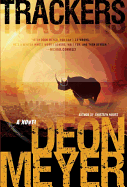
| Publisher: | Atlantic Monthly Press | |
| Genre: | Fiction, Thrillers | |
| ISBN: | 9780802119933 | |
| Pub Date: | September 2011 | |
| Price: | $24 |
| Mystery & Thriller |
by Deon Meyer
Trackers, Deon Meyer's latest thriller, travels from deep in the Karoo to the mean streets of post-apartheid South Africa. In this tale of multiple betrayals, a disparate band of characters have a shared instinct for survival. Freelance bodyguard Lemmer (Blood Safari) returns, this time to protect a pair of endangered black rhinos from poachers. In Cape Town, Milla Strachan, newly divorced and struggling to escape the suburban banality of her former existence, joins the lower echelons of national security. Meanwhile, former police superintendent Mat Joubert is learning the hard way that in the private sector the only thing he's expected to protect and serve is the bottom line. All three are drawn into a violent web of intrigue linking Islamic terrorists to urban gangsters, black-market weapons and blood diamonds.
A boon for the mystery/thriller connoisseur weary of the same old New York/Los Angeles backdrop, Meyer's South Africa is palpable, a world at once achingly beautiful yet torn still by deep-seated racial hatred and injustice. An American audience may find the Afrikaner author's lack of "coloured" or black protagonists jarring, but Meyer in no way hides from the remnants of apartheid; his unflinching take on South Africa reads as reality.
Trackers is a thick, meaty mystery so full of twists and subplots the reader could easily forget where the story began. Don't worry--Meyer skillfully ties up even the most frayed of loose ends. Be warned though, he waits until the last pages to do it. --Tom Lavoie, former publisher
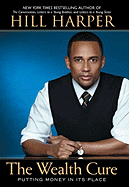
| Publisher: | Gotham Books | |
| Genre: | Personal Finance, General, Self-Help, Ethics & Moral Philosophy, Motivational & Inspirational, Philosophy, Business & Economics | |
| ISBN: | 9781592406500 | |
| Pub Date: | August 2011 | |
| Price: | $26 |
| Nonfiction |
by Hill Harper
Hill Harper's face on the cover of this book might be familiar from his long-running role playing Dr. Sheldon Hawkes on CSI: NY. But he's not just a pretty face: in addition to acting in many movies and TV shows, Harper graduated cum laude from Brown, has a law degree from Harvard and master's in public administration from Harvard's Kennedy School of Government. He also has devoted much of his spare time and energy to helping others manage their lives and achieve their dreams. This is his fourth book that aims to help in that challenge.
"I hope to dispel some of the confusion and anxiety around money and show how it can be an effective tool," Harper writes. "But most important, I want to help reinvent the fundamental understanding of wealth in order to help us achieve a balanced happy and healthy life."
Although Harper does include excellent resources for making and managing money responsibly, The Wealth Cure is not only about financial wealth. To Harper, "wealth" involves the pursuit of "unreasonable happiness"--finding and following one's passion, connecting to loved ones, maintaining a healthy lifestyle.
This last element of wealth became a particular focus for the author when he was diagnosed with thyroid cancer. Before his surgery, Harper decided to take a cross-country train ride from Los Angeles to Chicago to visit a friend struggling with his marriage. This transformational journey allowed Harper to contemplate his own path to success, as well as ways to help others find their own fulfillment. The result is The Wealth Cure--a wonderful gift for anyone starting out in life and a helpful resource and reminder for all Americans during challenging economic times. -–Kristen Galles, blogger at Book Club Classics
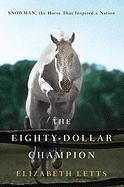
| Publisher: | Ballantine | |
| Genre: | United States, Showing/Training, Pets, History, Horses, 20th Century, Riding | |
| ISBN: | 9780345521088 | |
| Pub Date: | August 2011 | |
| Price: | $26 |
| Nonfiction |
by Elizabeth Letts
Elizabeth Letts has two novels to her credit--Quality of Care and Family Planning--as well as a children's book, The Butter Man. She's been an equestrian since childhood, so her first nonfiction book, The Eighty-Dollar Champion, about a remarkable horse, is a good fit, and the story is thrilling.
In the 1950s, Harry de Leyer, a young Dutch immigrant teaching riding at a girl's school, was looking for lesson horses. By chance, he spotted an old plow horse in a truck bound for the slaughterhouse. The calm expression on the horse's face caught Harry's eye, and he bought him for $80. Thus began a lifetime bond of trust and love. When Harry, needing money, had to sell Snowman to a nearby farm, Snowy, on his own, jumped five miles of paddock fences, once dragging an old tire, to get back home. So Harry began working with Snowy, training him to jump. After many tries, Harry unlocked the secret to the horse's gift.
Letts's taut, detailed writing vividly recounts the excitement of the shows; the heights these underdogs climbed; the world of the Eisenhower '50s; and what Snowman and Harry meant to the everyday people they inspired. This book is not only for horsemen and -women; we can all appreciate the beauty of a special bond in the way author describes show jumping: "On any given round, the horse's heartbeat melds with his own, the hoof beats becoming his own rhythm. The world around them melts away. All that remains are motion, flow, silence, and that incomparable feeling that is flight." --K.C. Martin, blogger at The Readable Feast
Learn more about The Eighty-Dollar Champion.
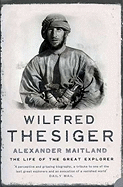
| Publisher: | Overlook Press | |
| Genre: | Travel, Expeditions & Discoveries, Essays & Travelogues, Biography & Autobiography, History, Adventurers & Explorers | |
| ISBN: | 9781590201633 | |
| Pub Date: | September 2011 | |
| Price: | $37.50 |
| Nonfiction |
by Alexander Maitland
Alexander Maitland was not only Sir Wilfred Thesiger's (1910-2003) biographer, but a friend of 40 years who accompanied Thesiger to Buckingham Palace in 1995, when Thesiger was knighted. Maitland's respect for his friend shines through all 544 pages of Wilfred Thesiger: The Life of the Great Explorer.
Born in Abyssina (now Ethiopia), Thesiger attended Eton and Oxford, but he began plotting as early as age 14 to return to the Africa he always referred to as "home." This he did, exploring the length of Ethiopia's Awash River in his 20s and then embarking on a life of exploration in northern Africa and the Middle East. He visited England only to see his beloved mother and brothers, and never more often than he had to.
In this biography, Maitland paints a portrait of Thesiger detailed in a way that only the work of a close friend could be. At some points, however, Maitland quotes so prolifically from Thesiger's own books that one wonders why one shouldn't skip the middleman and read the explorer's own works. Nevertheless, Maitland puts his work in order, preserving Thesiger's calm fascination with his travels while filling in the accounts with excerpts from letters, photographs, reports and interviews. The result is a striking and thorough biography of one of Britain's last great explorers. --Dani Alexis Ryskamp, blogger at Intractable Bibliophilia

| Publisher: | Blueroad Press | |
| Genre: | Biography & Autobiography, Women, Personal Memoirs | |
| ISBN: | 9780979650949 | |
| Pub Date: | July 2011 | |
| Price: | $18 |
| Nonfiction |
by Nancy Paddock
In this memoir, Minnesota playwright, poet and environmentalist Nancy Paddock gives a poignant account of one of life's cruelest fates. Detailing her experiences in guiding her parents through Alzheimer's disease, Paddock's story is at once a heartbreaking tribute and a tender love story. Through letters, old photographs and reminiscences, the author recounts her parents' 60-year romance and her own efforts to provide the best possible care for them as they become lost to the debilitating disease.
Paddock and her two sisters find themselves in conflict with an over-extended health-care system that focuses on efficiency and practicality to the detriment of a patient's dignity and independence. They are likewise forced to juggle the responsibilities of work and home life with their parents' ever-increasing vulnerability. Perhaps most affecting are the descriptions of Ralph and Lois Pearson struggling with what should come naturally--everyday decisions or behaviors that suddenly become treacherous and confusing. Through their daughter's eyes we see them grasping to find a reality and an identity that they can trust. In Paddock's telling there is evidence of a struggle that is all the more urgent because it is futile. But the story is not without hope. Though Ralph and Lois eventually succumb to age and illness, in her memories of them Paddock reminds us of the precious and ephemeral joy to be found in simply living one's life. --Judie Evans, librarian
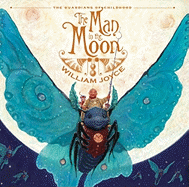
| Publisher: | Atheneum Books for Young Readers | |
| Genre: | General, Fairy Tales & Folklore, Holidays & Celebrations, Legends, Myths, & Fables, Juvenile Fiction | |
| ISBN: | 9781442430419 | |
| Pub Date: | September 2011 | |
| Price: | $17.99 |
| Starred | Children's & Young Adult |
by William Joyce
One day, Pitch, the King of Nightmares, with jet-black hair in up-floating coils as menacing as Medusa's snakes, hunts down this legendary child who has never had a bad dream. Nightlight whisks MiM away to safety, just before Pitch captures the child's parents. As Nightlight plunges his diamond dagger into Pitch's heart, an explosion results, and when MiM later reaches the Moon's surface, he sees the image of his parents etched in the stars. Their constellation offers MiM comfort, and the moon creatures rally around to educate and protect the baby.
Joyce's fans will relish the parallels with his earlier tour de force about a mythic man in a magical land, Santa Calls. Santa rides in his sleigh; MiM flies on his moth. Santa learns of children's wishes through letters; their hopes and dreams travel to MiM by helium balloons. When MiM comes up with a solution to children's nighttime fears, he recruits the Moon's minions and his team of earthling Guardians (Santa, the Tooth Fairy, etc.). Pitch and Nighlight's fates will be the subject of subsequent episodes, but this first adventure in the Guardians of Childhood series offers a visual feast and a complete mythology of the Man in the Moon. --Jennifer M. Brown, children's editor, Shelf Awareness
For more on The Man in the Moon, check out our Maximum Shelf.
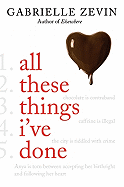
| Publisher: | Farrar, Straus & Giroux | |
| Genre: | Love & Romance, Law & Crime, General, Juvenile Fiction, Family | |
| ISBN: | 9780374302108 | |
| Pub Date: | September 2011 | |
| Price: | $16.99 |
| Children's & Young Adult |
by Gabrielle Zevin
Gabrielle Zevin (Elsewhere; Memoirs of a Teenage Amnesiac) continues to write smart, captivating novels. Her latest is a wicked combination of star-crossed love, whodunit, coming-of-age and dystopia that will keep you turning the pages. In the future of Zevin's crafting, life is not as we know it: chocolate and caffeine are controlled substances, camera phones are illegal, and no one remembers what OMG means. New York City, bankrupt and deteriorating, is home to Anya Balanchine, a no-nonsense 16-year-old and daughter of a crime lord. With both of Anya's parents dead, her grandmother's health failing rapidly, and her siblings relying on Anya to be the head of the household, she has more than enough responsibilities to keep her busy. She's managing pretty well, all things considered--until her brother unwittingly gets mixed up in "the family business."
When a batch of poisoned Balanchine chocolate starts to land people in the hospital, Anya's family is immediately suspect. To make matters worse, Anya is falling for the new district attorney's son--the DA who has sworn to crack down on organized crime and families like the Balanchines. As events spiral out of control and Anya tries to discover who is responsible for the frame-up, she will also discover how far she is willing to go to protect herself and her own. Zevin has created a frank, entertaining and thought-provoking read that will appeal to teens across the board. The best part? It's just the first installment! --Jenn Northington, events manager at WORD bookstore, Brooklyn, N.Y.